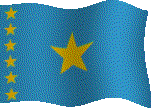























|

|

|

|

|

|

|

|

|

|

|

|

|

|

|

|

|

|

|

|

|

|

|
|
|
|

|
|
|
PATRICE LUMUMBA |
|
|
|
|
|
It is quite saddening to realize just how few people in Africa recognize the name Patrice Lumumba, one of the continent's greatest sons. Any African Political Historian worth their salt will tell you that Lumumba ranks among the biggest names in Africa's independence struggle, names like Kwame Nkrumah, Jomo Kenyatta, and Ahmed Sekou Toure. Lumumba was a proponent of Pan-Africanism, and thus shared a close relationship with Nkrumah and Tom Mboya, other avowed Pan-Africanists. Lumumba's shadowy picture could be as a result of his early death in 1961, only a year after his country's independence. Many have argued that his death, which came at the height of the independence struggle in most African countries put him in the back burner of most African political news. The same could be argued about Kenya's Tom Mboya, who died in 1969, just 6 years after Kenya gained independence. Like Mboya, Lumumba died before he could reap the fruits of the independence he had so earnestly fought for. Patrice Lumumba was born on July 2nd 1925 in the Belgian Congo(Zaire). He attended a protestant mission school and was by all accounts, quite an intelligent young man. He is said to have taken a very keen interest in writing having been impressed by the works of French writers like Voltaire and Rousseau. After attending the mission school, Lumumba moved to Kindu-Port-Empain where he participated actively in the club of evolues(educated Africans). He began writing essays and poems, which would often be published in the local journals. Most of his writings touched on burning topical issues and were usually critical of the colonial Belgian Administration. From his creative and incisive writings, it became apparent the young Lumumba was quite politically conscious and was destined for greatness. The young Lumumba then set out to the capital city Kinshasa(Leopoldville) to work as a post office clerk. He later relocated to Stanleyville(Kisangani), where he became an accountant for the post office. Later in 1955 Lumumba's leadership qualities saw him rise to become the Regional President of a trade union representing government employees---another striking resemblance to Kenya's Tom Mboya. Like Mboya, Lumumba used his unique trade union pulpit to spread his wings nationally. His position gave him a national outlook because he represented a cross section of workers, whose basic grievances were almost similar. This made him more appealing to the voters than his opponents, mostly leaders of regional political parties who only enjoyed support from their community members. As a matter of fact, it is for this reason that Lumumba, like Mboya enjoyed nationwide following quite early when most other politicians were still struggling to venture out of their tribal strongholds. Tshombe and Kasavubu(later President), both fierce opponents of Lumumba, came from very large communities but enjoyed only regional support. Lumumba, the national figure from the small Batetela tribe was therefore not very popular with these two individuals, and as we now realize, that bitter relationship indeed cost him his life. As a nationalist and pro-unity Prime Minister, Lumumba was not very well liked by his opponents who feared that a united government would limit some of their regional powers. Tshombe in particular was very concerned because Katanga, the industrial hub of Congo would fall out of his influence. The colonialists quickly cashed in on this internal feud, leading to the secession of Katanga, under Tshombe and his forces. When Lumumba tried to solicit President Kasavubu's intervention in the secession matter, he was fired by the President in an open show of support for Tshombe and his forces. Soon afterwards, Lumumba was brutally murdered by Tshombe's forces. His death has widely been speculated to have been the work of the Anerican CIA in collusion with the Belgian government who had very strong interests in the rich resources of the Congo, and who saw Lumumba as a stumbling block for his strong anti-western stance. Whether these allegations are indeed factual or not is clearly beyond the scope of this website. I believe the Lumumba and Mboya stories, apart from their heroic contents, should serve as reminders to us Africans, that we need to carefully re-examine some of the destructive politics that we have become so accustomed to. While the killings of these two African warriors might have satisfied the immediate political needs of the powers at that time, they seriously robbed the continent of two brilliant leaders, both of whom would have undoubtedly made significant contributions to the continent and the world. Despite the fact that Lumumba's story has not been told enough, the impact of this African Warrior on the continent will never be forgotten. It is quite ironic that one of the biggest tributes to Lumumba was bestowed on him by the Russians, who named The Patrice Lumumba University in Moscow in his honour. It would have been much better if it was an African University, but nonetheless, a very fitting tribute to one of Africa's bravest. |
|
|
Return to the Home Page |
|
|
Copyright©AfricanTribute.com Inc., 2002 |
|
|
|

|
|
|
|